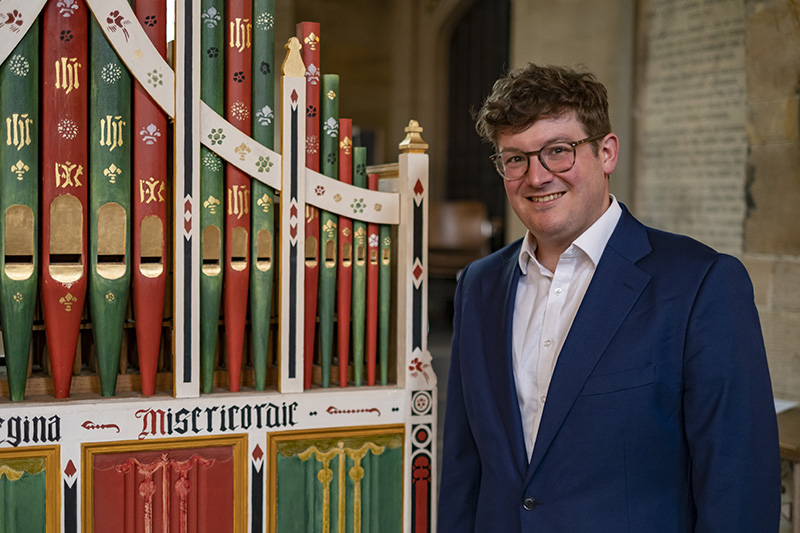On Friday 9th July 2023 we welcome our very own Alex Berry, our Director of Music, for a special organ recital ahead of his departure this summer, and before work begins on the instrument. In this edition of ‘Notes from an Organist’ we discover more about him and the recital including how the organ is an orchestra at your fingertips; meeting the King; and why organ recital series’ are important for the musical landscape.
Could you introduce yourself, how you got into music / become an organist and your musical journey to where you are today?
I have been at Bradford Cathedral since January 2017. Although my title is ‘Organist and Director of Music’, I spend much more of my time in front of the choir than in the organ loft. It is a rare treat for me to play today. I was inspired to play the organ as a chorister at Lichfield Cathedral. While I was there, the magnificent Hill Organ was restored, and I remember finding its sound electrifying. I took lessons throughout secondary school, spent a gap year as organ scholar at Guildford Cathedral and then held the organ scholarship at Queens’ College, Cambridge, while I studied music at the university.
Before coming to Bradford I worked for two years as Assistant Organist to Ely Cathedral Girls’ Choir, and then for a further two years as Assistant Organist at Magdalen College, Oxford.
What can people expect from your recital at Bradford Cathedral?
It starts with J. S. Bach’s Pièce d’Orgue in G major, BWV 572. This is the first piece I played in a service at Bradford, so it seems fitting to begin the recital with this piece. After that, I’ll play Serenade for Organ by Derek Bourgois. This is a fun little piece in the unusual key signature of 11/8 (except for the bit in the middle where it’s 13/8), written as a postlude for the composer’s wedding. I’ll follow this with Master Tallis’ Testament by Herbert Howells. The programme ends with Walton’s Coronation March, “Orb and Sceptre”, a kaleidoscope of post-war optimism.
Why do you enjoy playing the organ?
My official answer is that it’s like having an orchestra at your fingertips and you have such an amazing dialogue with the building in which you’re playing.
The real answer is because the organ is really loud!
Do you have a particular favourite piece out of those you are playing?
I love Master Tallis’s Testament by Herbert Howells. I’ve always loved Howells’s music, and I love how this piece takes a faux Tudor melody, clothes it in the richest romantic harmony, and builds it from the very quietest flutes right to full organ.
This recital season we celebrated ‘music for royal occasions’. Which of your pieces represents this, and why did you choose it?
I’ve chosen William Walton’s Coronation March “Orb and Sceptre”, written for the coronation of the late Queen HM Elizabeth II in 1953. This was one of my favourite pieces as a chorister, and I can remember dancing along to it whenever it was played. I’ve been meaning to learn it for ages, so this series gave me the perfect excuse.
Have you ever met any royalty and / or played for them?
I met the King when I was a child. He asked me all about being a chorister and whether I enjoyed it. I don’t think I’ve ever played for royalty. I’ve accompanied Lesley Garrett, and I definitely played for a funeral at which Margaret Thatcher was present. But please don’t tell anyone…!
Finally, how would you sum up your upcoming recital at Bradford Cathedral?
The programme should have something which will appeal to everyone. There’s some royal fizz and fireworks, there’s a grand piece of Bach, and there are some beautiful melodies.
You are the Director of Music at Bradford Cathedral. Organ recital series are held across the country – why are they important for the musical landscape?
The organ is an extraordinary musical instrument. Each instrument is unique, and most have been especially designed for their space. It is the instrument with the largest repertoire, and yet it is an instrument that is notoriously difficult to record.
Going to an organ recital to hear these instruments and amazing organists in the flesh is a completely different experience from hearing them on disc. It is also a rare opportunity to hear live classical music for free in a city where classical concerts are few and far between.
The Bradford series is also special because of the lunch. For many in our audience, it is a weekly social event that they look forward to, and I really enjoy the buzz before and after the concerts.
The Bradford Cathedral organ will soon be undergoing refurbishment – what do you hope from the organ from this autumn?
The work is being undertaken to the swell division of the organ. This part of the organ is in a box with shutters that can be opened and closed to control how loud and soft you can play. For this reason, we use the swell principally to accompany the choir and congregation in singing. Once the work is completed, the organ will have more of the softer sounds it had in 1904, which will really help in our daily work with the cathedral choir. It will also have some new sounds — voix célestes, vox humana, echo bourdon — that will widen the range of colour within the organ. I’m very much looking forward to hearing once it’s finished.
You finish your time at the Cathedral at the end of August, but are you hoping to come back at a future recital to play on the refurbished organ?
Oh, yes! I’d love to. I have no doubt that the work will be a great success, and I’m really looking forward to hearing how the new stops combine with the organ.
Looking back at your time as the Director of Music, what have been some of your highlights?
There are many and varied highlights. The concerts have been especially memorable: our collaborations with the European Union Chamber Orchestra early in my time, and joint concerts with City of London Sinfonia and VOCES8. Our tour to Germany in 2019 was a wonderful achievement, and I really hope that the choir will be permitted to tour abroad again, now the pandemic is well behind us. I’ve particularly enjoyed encouraging choristers from unlikely backgrounds to love English choral music.
Could you tell us a little about your next role?
In many ways it’s very similar. I shall inherit a choir made up children recruited from schools across Cambridge. We’ll sing three or four services every week during term time. The church is right in the centre of Cambridge and hosts a lot of large-scale university and civic events: it’s a place where town and gown come together. I’m looking forward to being in a city I love, somewhere with such a vibrant choral scene, and to building on the excellent work of my predecessors.
Finally, how would you sum up your time at Bradford Cathedral?
Working in Bradford has been a formative experience for me. I have learnt a huge amount about and from the people of this city and region, and have often been treated with great kindness. It has not, however, always been an easy time. Building and sustaining a choral foundation in a deprived post-industrial and intercultural context is a tall order, but I’ve always had the sense that the cathedral, city and diocese really cherish the music that is offered here.
I wish my colleagues in the cathedral every success for the future, and I thank all involved in the cathedral choir for their encouragement, steadfastness and musical prowess over these past six-and-a-half years.
You can join us on Sunday 9th July at 4:45pm for Alex Berry’s organ recital, with an optional £4 buffet lunch beforehand at 12:30pm.
You can discover more about our organ recital season on our dedicated page

